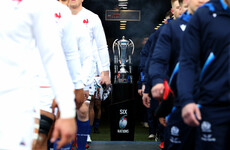20 OFFLOADS AND 14 linebreaks make for pretty reading among the statistics from Ireland’s 60-5 hammering of Japan yesterday.
Those figures are actually a repeat of the totals Ireland hit against the US back in July but this meeting with the Japanese was expected to be much, much tougher.
The temptation is to write the positives off from Ireland’s point of view by focusing on the fact that Japan were so poor in Dublin. Jamie Joseph’s side certainly didn’t turn up in anything like the fashion we’ve come to expect from them, but it would be unfair to Ireland not to credit them for making the Japanese look so bad.
The Irish attack was superb on a very good day for head coach Andy Farrell and his attack specialist, Mike Catt.
While the stats might have echoed the summer win against the US, this victory over Japan was more of a continuation of the impressive Six Nations success against England back in March.
Ireland’s attack was sharp on that occasion and we will find out even more about this aspect of their game next Saturday as the All Blacks visit the Aviva Stadium.
Against Japan, Ireland’s attack featured strong decision-making, excellent work-rate, fluid interplay between forwards and backs, and some superb skills.
Heads up
Ireland had their opening try in the fourth minute and it actually came on the phase directly after they lost the gainline, which is generally not a promising sign.
Tadhg Beirne attempts to pull a pass back to Johnny Sexton in this instance but it’s inaccurate and Japan have the out-half well covered, smothering him for a loss of eight metres.
But note how Garry Ringrose is on the move from Ireland’s right to left just as Sexton is tackled and Beirne and Caelan Doris retreat to secure the breakdown.
Ringrose swings into the shortside as Bundee Aki, Jack Conan, and James Lowe [blue below] reload on that side of the tackle.
As we can see below, Ringrose works all the way around the corner to offer himself as a viable option at first receiver.
Even before Ringrose has shown in the shortside, Japan flanker Ben Gunter has been calling for more bodies and width in the defensive line.
In the moment below, Gunter is signalling for defenders to fold onto that side of the ruck.
As Gunter looks up, he has to worry about Ireland scrum-half Jamison Gibson-Park passing to the late-arriving Ringrose. Gunter’s eyes are attracted into Ringrose [red below].
At the same time, Aki runs a subtle ‘overs’ line [blue above] away from the ball to the outside of Gunter.
Gibson-Park reads the situation expertly, identifying the opportunity outside Gunter and firing his pass across the face of Ringrose, putting enough power on it to ensure Aki can continue on his overs line.
The Ireland centre hitches outside Gunter and though the Japan back row reacts to get his hands to Aki, he’s able to offload to Conan on his outside and the number eight stays square upfield to draw Japan fullback Kotaro Matsushima before freeing Lowe.
Lowe would have expected to meet another defender covering across here but on a bad day for Japan, their defensive system has failed them early in the game.
We can see below that Japan have only Matsushima in the backfield as Sexton is tackled a phase after a poor exit kick from out-half Yu Tamura.
Andrew Conway hugging Ireland’s right touchline helps to keep Japan’s edge defenders high on that side, but they’re late to get a second body into the backfield.
Only as Aki breaks and Matsushima swings up on that side do we see left wing Siosaia Fifita working across.
Lowe has inside support from Gibson-Park so Ireland might have finished even if Japan had been more organised, but the left wing can canter home from 35 metres out.
This is good ‘heads up rugby’ from Ireland after losing the gainline, with Ringrose’s off-the-ball work and the decision-making of Gibson-Park and Aki producing the initial bust before Conan and Lowe finished off the chance against poor Japanese defence.
Interplay
Ireland’s second score in the 11th minute was a gem and started with Conway winning a Japanese box kick 30 metres from his own line before finishing the try 45 seconds later after nine of his team-mates had touched the ball.
When Conway initially fields the Japanese kick, there is an immediate jackal threat from Gunter but Conan and James Ryan aggressively clear him away to leave the ball on a plate for Gibson-Park.
As that’s happening, Ireland are finding shape to the left of the ruck after the turnover of possession, organising themselves into the 3-2 set-up we see below.
Furlong, Rónan Kelleher and Andrew Porter [red above] make up the three-man pod close to the ruck, while Doris and van der Flier [blue] are the two-man pod further infield.
Now we see some of that nice interplay as Kelleher links a pass out the back to Sexton in the ‘release’ position behind the three-pod.
Sexton ‘turns the corner’ out the back of the three-pod, straightening upfield to engage a Japanese defender and the temptation for Sexton is to play out the back of the two-pod to fullback Hugo Keenan, looking to get the ball to width immediately.
Instead, Sexton identities the sliver of space indicated in blue above.
Sexton wants Ireland to get moving forward here and picks out van der Flier running a direct line into that space, with the openside’s leg drive taking him over the gainline.
On second phase, it’s something similar as Sexton hits Aki and offers himself on a loop line but the centre carries directly at Japan to win the gainline.
Again, there’s a Japanese jackal threat – lock James Moore this time – but Porter arrives in with a thunderous clearout to remove him.
Ireland move a third phase to their left and Lowe does very well to keep the ball in play as he is nearly tackled into touch, his offload being followed by a nice draw-and-pass from Gibson-Park to Ringrose.
It’s deft stuff from Lowe as he gets the ball away with inches to spare.
Gibson-Park is emptied by Gunter just after passing, leaving him on the ground and out of the game momentarily.
But Lowe reacts well to keep the tempo high for Ireland as he steps in to act as the scrum-half to launch the next phase.
As Lowe passes from the breakdown, Ireland have slipped into 1-3-2-2 attacking shape, which Farrell and Catt have implemented over the past two years.
The wide angle below gives us a good view of that shape.
Kelleher [higlighted in pink] is the ’1′ and has been involved in the breakdown, while Porter, Furlong, and Doris [red] make up the three-man pod off the ruck.
In midfield, van der Flier and Beirne [blue] make up the first two-man pod, while Ryan and Conan [black] are the final two-man pod.
Below, we see an overhead illustration of Ireland’s shape.
This 1-3-2-2 shape aims to ensure that Ireland always have good width in their attack with a spread of forwards across the pitch, allowing some of the interplay we will see on this phase.
The attacking shape itself is only intended to be a framework from which Ireland’s players can make decisions based on the opportunities presented by the defence and this is a good example of that.
Tadhg Furlong’s link pass out the back to Sexton is a thing of beauty.
Furlong stays square up the pitch [red below] to engage Japan hooker Atsushi Satake and disguise his intention to pass, while Doris runs an excellent ‘unders’ line to Furlong’s right [yellow].
Doris’ convincing line forces Japan captain Lappies Labuschagne [spotlighted above] to turn his shoulders in for fear that Furlong tips-on a short pass to the Ireland blindside.
Instead, Furlong pulls an accurate pass behind Doris to Sexton, who turns the corner into the space on the outside of Labuschagne.
Kazuki Himeno turns in to tackle Sexton but the Ireland out-half’s hands are free, allowing him to offload to van der Flier, who does the same to find Beirne, who flicks a pass on to Aki after the centre has surged up from behind this two-man pod.
Matsushima does a good job of drifting off Beirne to tackle Aki but Ireland still score on the next phase. The presence of the final two-man pod of Ryan and Conan [black below] is important here as they engage defenders.
Note also how Lowe has worked across from the left-hand touchline to offer a threat out the back of Ryan.
Gibson-Park again makes a strong decision here as Tamura rushes up on Conan looking to close down the wide passing option. Tamura advancing leaves lots of space in behind and Gibson-Park rolls a delightful grubber kick out to the right for Conway to race onto.
A perfect bounce pops the ball up into Conway’s hands and he can finish past Japan scrum-half Yutaka Nagare, who possibly could have worked a little harder to close across into the space earlier.
That said, Nagara has just had to cover lots of ground over and back across the pitch as Ireland have surged 70 metres downfield in a stunning passage of attack.
It’s as fluid a score as Ireland have delivered under Farrell and Catt.
Second-half repeat
The try finished by Aki in the second half had some similarities to the Conway effort above, particularly in the interplay between forwards and backs.
We join on the fourth phase of a scrum attack that has initially struggled to make it over the gainline but does so in searing fashion with Ireland in their 3-2 shape.
The three-pod [red below] off the ruck is made up of Doris, Peter O’Mahony, and Beirne.
Furlong and Porter form the two-man pod [blue above] in midfield.
This example also underlines the importance of backs being connected to the forward pods, with Sexton out the back of the three-pod and Ringrose offering a release option out the back of Furlong and Porter.
Again, Ireland’s skills and decision-making within the shape are the real key.
O’Mahony is at the centre of the three-pod and he engages the defenders in front of him, threatening to carry himself, while Beirne runs a convincing line on his outside to offer the possibility of a tip-on pass, again forcing a Japanese defender to turn in.
As we see below, O’Mahony swivels to play out the back to Sexton, who sends Furlong surging onto a linebreak.
Ringrose’s positioning is vital to the linebreak.
As Sexton fixes Sakate [white below], Japan centre Timothy Lafaele has initially read a possible pass out the back to Ringrose [yellow].
Similar to our earlier example, the temptation for Ireland is to play out the back to Ringrose and try to move the ball wide here – Lowe and hooker Kelleher have held width to stretch the Japan defence.
But instead they play through Japan as Sexton picks up Furlong on that hard line inside Lafaele, who reacts late and can’t stop the dynamic tighthead.
Furlong shows his skillset by drawing in Matsushima and flicking a pass away to Porter, who has stayed connected to him from that initial two-pod.
Porter is grounded by Japan wing Dylan Riley, with Furlong and Ringrose clearing out the breakdown, then we see more strong off-the-ball work-rate from Ireland to help them finish the chance.
Sexton is signalling for Gibson-Park to play back to the right and we can see that Conway is close to the breakdown having cleverly run inside support for Furlong’s linebreak.
Fullback Keenan has surged over onto that left-hand side along with Sexton but he now redirects as the Ireland out-half senses the opportunity on the right.
Gibson-Park feeds Ryan for a carry and we can see Keenan, Sexton, and Conway in motion.
The skill level is once again very pleasing for Ireland as their catch-pass technique comes up trumps against the scrambling Japanese defence to give Aki a one-on-one opportunity to finish.
Again, Ireland’s attacking shape plays a part in this score but it is really only a means of facilitating good decision-making, work-rate and skills.
Lowe role
There was one particularly interesting passage of Irish attack in the first half that didn’t lead to a try but saw them make a 70-metre gain and win a penalty.
They break out of their own 22 after another pass from a three-pod out the back to Sexton, with Beirne linking the ball on this time before Sexton frees Lowe on a bust up the middle. Again, Ireland play through Japan rather than forcing the ball wide.
This is particularly interesting because Lowe is positioned where Ireland’s fullback, Keenan, generally might have been in the past.
A few phases later, with Ireland in their 1-3-2-2 shape again and after a strong Ryan carry, we see Lowe popping up in another central position as Sexton splits the first of the two-man forward pods to hit Lowe out the back.
Lowe delivers a classy touch as he lures Gunter into turning his shoulders in before passing to Conan, who breaks upfield – leading on to Ireland winning a penalty and scoring three points.
This all stems from Ireland receiving a kick-off and perhaps Lowe’s central starting position was based on having his big left boot available for a kick.
We actually saw the pattern being repeated on another Ireland ‘exit’ soon after.
It must also be noted that Lowe had one wild pass when he was positioned out the back of the two-pod in the first half.
However, Lowe is a creative player and an excellent strike runner – as we see in the two clips above – so it makes sense to have him more regularly involved in this manner and it will be interesting to note if Ireland continue getting him so centrally involved.
Sexton’s score
There were several other pleasing moments for Ireland’s attack in this game, including a superb first-phase try for Conway in the first half after a big Irish maul and slick handling from Sexton, Aki and Keenan.
It was fitting that Sexton himself got in on the try-scoring act in the second half after Keenan’s excellent 50:22 kick had given Ireland a close-range lineout.
Sexton swung into the shortside and Gibson-Park sniped to draw in Fifita before feeding his captain to break Nagare’s tackle attempt and dot down.
Sexton’s dart drew what was by some distance the biggest roar on a happy day for this Ireland team.
They will face a much more severe challenge next weekend from the All Blacks and there will almost certainly be fewer opportunities for their attack to open up like it did yesterday, but these encouraging signs will give them some belief.













































Is he Welsh?
@Trevor Beacom: nope born in England to two Irish parents
Looking forward to John Cooney coming to Ulster. He could surprise a few people if he stays fit and if he gets game time. Paul Marshall really always has been an impact player. It will be interesting to see if he can gel with PJ and how well he can develop.